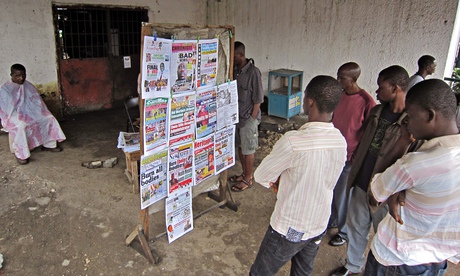Liberia and Sierra Leone have declared states of emergency, ordered the closure of schools and markets, and quarantined affected communities in an attempt to halt the Ebola epidemic that has claimed more than 700 lives across west Africa.


The leaders of the two countries cancelled planned trips to Washington for a US-Africa summit next week so they can meet on Friday in Conakry, the capital of Guinea to discuss the crisis.
In Nigeria, where a Liberian civil servant died of Ebola after flying to the commercial hub of Lagos, airport authorities began screening passengers arriving from places at risk for high temperatures.
Liberia's president, Ellen Johnson Sirleaf, announced the emergency measures after a behind-closed-doors meeting earlier this week in which medical officials painted a stark picture, according to an aide present at the meeting.
Internal ministry of health reported that 606 people suspected of having the virus in a single day this week.
In Bomi County, one of the areas recommended for quarantine, the report noted "probable and negative cases are being held in the same room with no attention". Health officials there were requesting training, it added.
"It's a dire situation. The spread is overwhelming health workers and facilities. We need all the help and support we can get from the international community," said Lewis Brown, Liberia's information minister. He said communities hit hardest would be quarantined for as long as necessary, enforced by security forces. "It's an emergency, so we hope people will understand."
Sierra Leone's president, Ernest Bai Koroma, said the state of emergency would last between 60 to 90 days. House-to-house searches to trace victims will be conducted, and new at-risk neighbourhoods will be placed under quarantine if necessary.
A nationwide hunt was sparked in the capital, Freetown, when a patient was forcibly removed from hospital last week. She died while being returned in an ambulance two days later.
The latest action comes as senior western officials, including from the USand UK, held meetings to assess the risk of Ebola reaching their shores.
The US has recalled its Peace Corps volunteers from all three countries.
The latest measures are similar those that rapidly ended a 1997 Ebola breakout in Uganda, which has sent in a medical team to help.
Many rural communities view Ebola with much the same terror and misunderstanding as westerners did when the Aids epidemic began, and have sometimes attacked overstretched health officials struggling to contain the epidemic. Those on the frontline have been among the hardest hit by the disease, which has claimed the lives of Liberia and Sierra Leone's most experienced Ebola doctors.
No comments:
Post a Comment